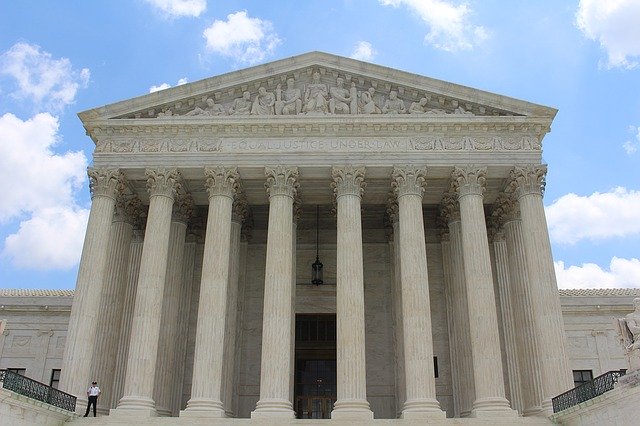By Madison Breshears
The politics of wartime have never been conducive to the protection of individual liberties. Still, conflict provides an illuminating stress-test for the condition of a nation’s commitment to its self-proclaimed values—excavating and laying bare critical questions about the democratic conscience that may have otherwise remained unexamined.
It was not until the unprecedented hostilities of the First World War that the United States contended explicitly with the theoretical frontiers of its First Amendment.[1] Several freedom of speech cases were heard by the Supreme Court in its wake, among them, Frohwerk v. United States,[2] decided this week in 1919.
Petitioner Jacob Frohwerk was indicted under the Espionage Act of 1917 for drafting twelve articles that were published in the German-language publication, the Missouri Staats Zeitung, in which he criticized American motivations for entering World War I and venerated the German state. In one of the articles, Frohwerk was said to have drawn “a picture, made as moving as the writer was able to make it, of the sufferings of a drafted man, of his then recognizing that this country is not in danger and that he is being sent to a foreign land to fight in a cause that neither he or anyone else knows anything of, and reaching the conviction that this is but a war to protect some rich men’s money.”[3] For this and several other articles in a similar vein, he was indicted on thirteen counts for attempts to cause “disloyalty, mutiny, and refusal of duty in the military and naval forces of the United States.”[4]
The Court declared that there was no specific intent requirement for the crime of treason and conspiracy—indeed there was no indication that Frohwerk had intended to distribute the paper among draftees or military personnel, and no showing that a bona fide insurrection or conspiracy was ever initiated or planned.[5] Nevertheless, the Court affirmed his conviction under the Espionage Act and denied that the conviction violated freedom of speech, expression, or the press.[6] Justice Oliver Wendell Holmes, in the unanimous opinion of the Court, wrote “…the First Amendment, while prohibiting legislation against free speech as such, cannot have been, and obviously was not, intended to give immunity for every possible use of language.”[7]
Americans who learn of it today often meet the outcome of this case with surprise, or even outrage. The contemporary conception of the American ethos is inextricable from a sweeping and robust view of our rights to free speech and expression, especially in political matters like the one dealt with in Frohwerk. To reconcile the case, it is useful to know that popular perception of democracy changed between the two world wars—after World War II it was common to insist that free expression was a prerequisite for democracy.[8] But from the founding until the 1920s, American democracy was widely perceived as republican rather than pluralist. In this republican democratic system, individual liberty remained a cornerstone, but such liberties were necessarily subordinate to the common good when community interests were implicated.[9] While free expression was entitled to protection, courts frequently engaged in balancing tests against broadly construed societal interests, developing a ”bad tendency” litmus, which standardized the practice of penalizing speech that was perceived to have harmful consequences.[10] And, aided by a theory of constructive intent, courts further lowered the barriers to conviction by bypassing mens rea inquiries, finding presumptive intent where such negative outcomes were “natural and probable consequences” of the defendant’s speech.[11]
Such a seemingly subjective and flimsy test may strike laymen and free speech purists alike as an obvious invitation for abuse. But following the country’s formal entry into the war in 1917, then-president Wilson promptly sought to wield state power to suppress opposition—explaining, in a statement that would shock our modern sensibilities, “censorship…is absolutely necessary to the public safety.”[12] A year after the Espionage Act was first passed, Congress effortlessly amended it to widen its scope.[13] The Sedition Act, as it would come to be called, criminalized “disloyal, profane, scurrilous, or abusive” statements directed at the government, Constitution, flag, or armed forces, or which in any way interfered with the collection of war bonds.[14] Over 2,000 prosecutions were initiated by the Department of Justice under the Espionage and Sedition Act, and convictions were secured in over half. Penalties could be as severe as a twenty-year prison sentence.[15] The Sedition Act was repealed by Congress in 1920, having never been ruled unconstitutional by any court. Frohwerk was convicted under the provisions of the Espionage Act alone—the decision has never been overturned.[16]
The decision in Frohwerk v. U.S. is emblematic of a unique moment in our nation’s history, one in which a relatively new democratic republic was subjected to a stringent test of its then-experimental principles of law and justice. The decision provides stark contrast and useful perspective on how dramatically our legal priorities with respect to freedom of expression have shifted. The case should also compel those who value a broad interpretation of First Amendment rights to reflect on the gap that remains between who we think we are, and who our legal history suggests we might be.
[1] Stephen M. Feldman, Free Speech, World War I, and Republican Democracy: The Internal and External Holmes, 6 First Amend. L. Rev. 192 (2008).
[2] Frohwerk v. US, 249 U.S. 204 (1919).
[3] Id. at 207.
[4] Id. at 205.
[5] Id. at 209.
[6] Id. at 210.
[7] Id. at 206.
[8] Feldman, 195.
[9] Feldman, 196.
[10] Id.
[11] Id. at 197.
[12] Id. at 201.
[13] Id.
[14] Sedition Act of 1917, Pub. L. No. 65-150, 40 Stat. 553 (1918) (repealed 1920).
[15] Feldman, 202.
[16] Frohwerk, 249 U.S. 204, 210 (1919).


